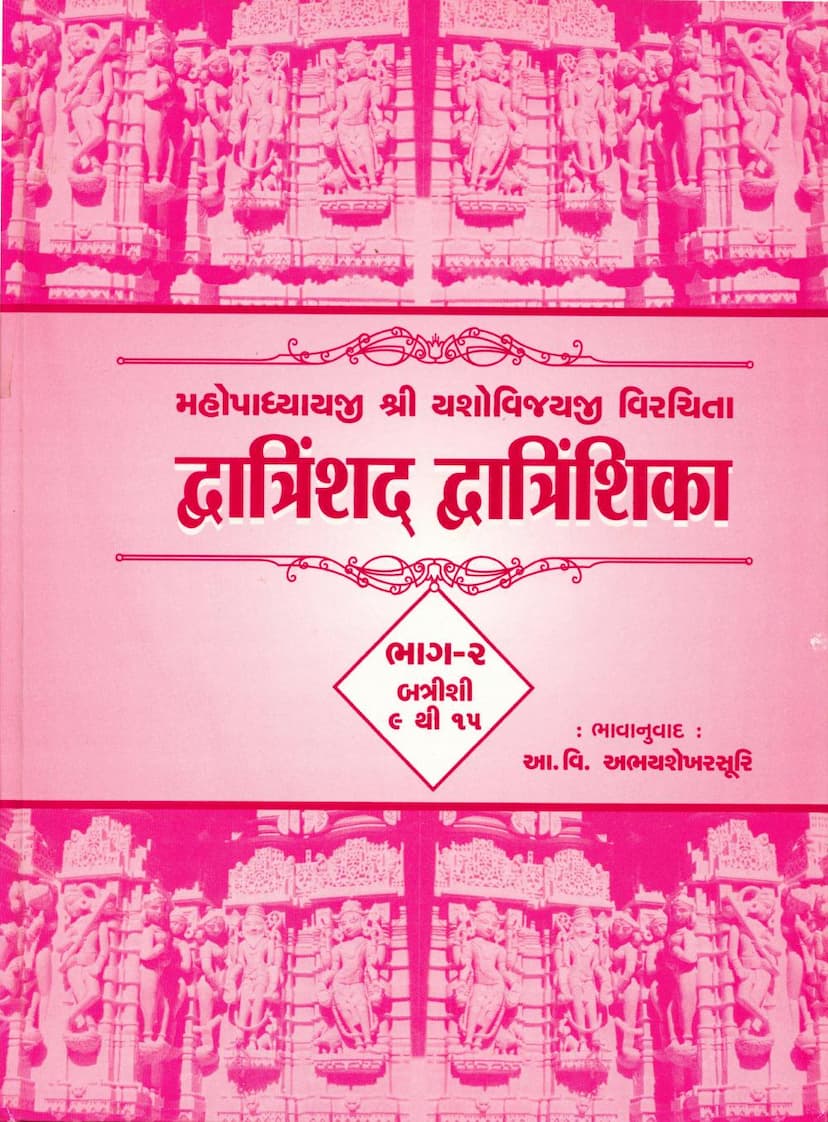Dwatrinshad Dwatrinshika Part 02
Added to library: September 1, 2025

Summary
Here's a comprehensive summary of the Jain text "Dwatrinshad Dwatrinshika Part 02" by Acharya Vijay Abhayashekharsuri:
Overall Context:
The text, "Dwatrinshad Dwatrinshika Part 02" by Mahopadhyay Shri Yashovijayji, is the second part of a larger work, the "Dwatrinshad Dwatrinshika." This specific volume (Bhag-2) covers the sections from the 9th to the 15th "Batreishi" (a section within the larger work). The translation and commentary are by Acharya Vijay Abhayashekharsuri, a disciple of Shri Vijay Prem-Bhuvanbhanu-Dharmjit-Jaykhekharsurishwar. The book was published by Divyadarshan Trust.
Core Content and Themes:
The "Dwatrinshad Dwatrinshika" is a significant work by Mahopadhyay Shri Yashovijayji, a prominent Jain scholar. This particular part delves into various philosophical and ethical concepts crucial to Jainism, offering detailed interpretations and elaborations. Based on the table of contents provided, the text covers the following major topics:
-
Katha Dwatrinshika (9th Batreishi): This section discusses the classification of narratives or discourses (Katha) into four types: Arthakatha (narratives about wealth/material pursuits), Kamakatha (narratives about desires/sensual pleasures), Dharmakatha (narratives about righteousness/duty), and Mishrakatha (mixed narratives). It further elaborates on the types of Dharmakatha, categorizing them into Akashephani (attracting/engaging), Vikshepani (diverting/dislodexpanding), Samvejani (inspiring awe/devotion), and Nirvejani (instilling detachment/caution). The text also explores the importance of the speaker's approach and the listener's disposition in conveying religious narratives effectively.
-
Yogalakshan Dwatrinshika (10th Batreishi): This section focuses on the concept of Yoga, defining it primarily as the union or connection with liberation (Moksha). It analyzes the essential qualities and causes for achieving this union, discussing characteristics of those who are attached to worldly existence (Bhavabhinandi) and the importance of righteous conduct, wisdom, and effort. It further explores the concept of 'Yoga' in relation to different stages of spiritual progress and the cessation of suffering.
-
Pat anjal Yogalakshan Dwatrinshika (11th Batreishi): This part critically examines the definition of Yoga as presented by Patanjali, which is the cessation of mental fluctuations (Chitta Vritti Nirodha). The text analyzes Patanjali's concept of Purusha (the self) and Prakriti (matter) and their interaction. It scrutinizes the idea of the Purusha's isolation (Kaivalya) and the role of Prakriti in worldly entanglement and liberation. The commentary discusses the five modifications of the mind (Vritti) and the methods to control them. The text also delves into concepts like discrimination (Viveka Khyati) and detachment (Vairagya) as presented in Patanjali's Yoga Sutras, offering a Jain philosophical perspective on them.
-
Purva Seva Dwatrinshika (12th Batreishi): This section emphasizes the concept of 'Purva Seva' (preliminary service) as a foundational practice for spiritual progress. It outlines various forms of Purva Seva, including the veneration of Gurus and deities, righteous conduct (Sadachara), ascetic practices (Tapas), and the cultivation of detachment towards liberation (Muktyadvesha). The text stresses the importance of sincerity and proper intention in these preliminary acts, highlighting how they prepare the individual for deeper spiritual pursuits.
-
Muktyadvesha Pradhanya Dwatrinshika (13th Batreishi): This section focuses on 'Muktyadvesha' (detachment from liberation itself), explaining its significance and the different ways it can be cultivated. It discusses the role of detachment from even the desire for liberation and highlights the importance of righteous conduct, virtue, and the guidance of a spiritual teacher. The text also touches upon the nuances of detachment in different contexts and its relationship with spiritual progress.
-
Apunarbandhak Dwatrinshika (14th Batreishi): This section likely deals with the state of 'Apunarbandhaka' (one who is no longer bound by karma) and the path towards it. It might explore the characteristics of such liberated souls, their spiritual journey, and the practices that lead to such a state. The emphasis might be on the purification of the soul and the ultimate detachment from worldly actions and their consequences.
-
Samyagdrushti Dwatrinshika (15th Batreishi): This section focuses on the characteristics and path of a 'Samyagdrushti' (one with Right Faith/View). It likely elaborates on the essential principles of Jainism, such as Right Faith, Right Knowledge, and Right Conduct, and how they are practiced and cultivated in daily life. The text probably discusses the discernment between virtuous and non-virtuous actions and the importance of aligning one's conduct with spiritual principles, leading towards liberation.
Commentary and Translation:
Acharya Vijay Abhayashekharsuri's commentary and translation are praised for their depth and ability to reveal subtle meanings and profound insights that might not be apparent in previous commentaries. The Acharya's understanding of philosophical concepts is highlighted, suggesting a meticulous and insightful approach to the original text.
Key Jain Philosophical Concepts Discussed:
The text, through its detailed exploration of these Batreishis, engages with fundamental Jain philosophical concepts, including:
- Karma: The nature of karma, its bondage, and its cessation is a recurring theme, especially in the context of spiritual progress.
- Right Faith, Knowledge, and Conduct (Ratnatraya): The cultivation of these virtues is likely presented as essential for spiritual advancement.
- Detachment (Vairagya): The text explores different levels and nuances of detachment, particularly towards worldly pleasures and even the desire for liberation itself.
- The Nature of the Self (Soul): The commentary likely offers a Jain perspective on the soul's true nature, its bondage, and its ultimate liberation, contrasting it with other philosophical schools where relevant.
- The Path to Liberation (Moksha Marga): The entire work is oriented towards explaining the path to liberation, highlighting the importance of correct understanding, practice, and detachment.
Overall Significance:
This volume is a significant contribution to Jain literature, offering a comprehensive and insightful exposition of complex philosophical ideas. Acharya Vijay Abhayashekharsuri's work serves as a valuable guide for spiritual seekers aiming to understand and implement the principles of Jainism in their lives. The text emphasizes the practical application of these teachings for attaining ultimate well-being and liberation.